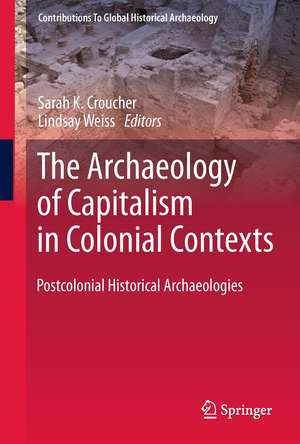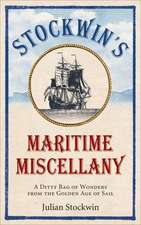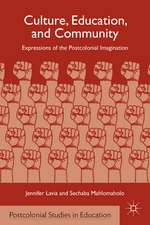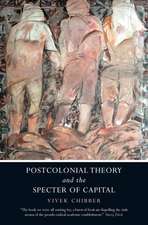The Archaeology of Capitalism in Colonial Contexts: Postcolonial Historical Archaeologies: Contributions To Global Historical Archaeology
Editat de Sarah K. Croucher, Lindsay Weissen Limba Engleză Paperback – 24 oct 2013
Examining case studies from North America, South America, the Caribbean, Africa, Australia, the Middle East, and Europe, the chapters offer an unusually broad ranging geography of historical archaeology, with each focused on the interplay between the particularisms of colonial structures and the development of capitalism and wider theoretical discussions. Every author also draws attention to the ramifications of their case studies in the contemporary world. With its cohesive theoretical framework this volume is a key resource for those interested in decolonizing historical archaeology in theory and praxis, and for those interested in the development of modern global dynamics.
| Toate formatele și edițiile | Preț | Express |
|---|---|---|
| Paperback (1) | 642.36 lei 43-57 zile | |
| Springer – 24 oct 2013 | 642.36 lei 43-57 zile | |
| Hardback (1) | 645.79 lei 43-57 zile | |
| Springer – 10 aug 2011 | 645.79 lei 43-57 zile |
Din seria Contributions To Global Historical Archaeology
- 15%
 Preț: 640.24 lei
Preț: 640.24 lei - 15%
 Preț: 643.84 lei
Preț: 643.84 lei -
 Preț: 399.12 lei
Preț: 399.12 lei - 15%
 Preț: 639.90 lei
Preț: 639.90 lei - 15%
 Preț: 644.82 lei
Preț: 644.82 lei - 15%
 Preț: 636.80 lei
Preț: 636.80 lei - 15%
 Preț: 643.84 lei
Preț: 643.84 lei - 18%
 Preț: 949.23 lei
Preț: 949.23 lei - 15%
 Preț: 640.24 lei
Preț: 640.24 lei - 15%
 Preț: 640.06 lei
Preț: 640.06 lei - 15%
 Preț: 641.71 lei
Preț: 641.71 lei - 15%
 Preț: 646.75 lei
Preț: 646.75 lei - 15%
 Preț: 642.03 lei
Preț: 642.03 lei -
 Preț: 390.46 lei
Preț: 390.46 lei -
 Preț: 391.79 lei
Preț: 391.79 lei - 15%
 Preț: 642.51 lei
Preț: 642.51 lei - 15%
 Preț: 647.73 lei
Preț: 647.73 lei -
 Preț: 383.71 lei
Preț: 383.71 lei -
 Preț: 387.96 lei
Preț: 387.96 lei - 15%
 Preț: 643.99 lei
Preț: 643.99 lei - 18%
 Preț: 968.65 lei
Preț: 968.65 lei - 15%
 Preț: 639.08 lei
Preț: 639.08 lei - 15%
 Preț: 636.63 lei
Preț: 636.63 lei - 18%
 Preț: 954.93 lei
Preț: 954.93 lei -
 Preț: 384.86 lei
Preț: 384.86 lei - 15%
 Preț: 641.85 lei
Preț: 641.85 lei - 15%
 Preț: 641.53 lei
Preț: 641.53 lei - 15%
 Preț: 643.99 lei
Preț: 643.99 lei - 15%
 Preț: 645.28 lei
Preț: 645.28 lei - 18%
 Preț: 733.46 lei
Preț: 733.46 lei
Preț: 642.36 lei
Preț vechi: 755.72 lei
-15% Nou
Puncte Express: 964
Preț estimativ în valută:
122.93€ • 127.56$ • 102.75£
122.93€ • 127.56$ • 102.75£
Carte tipărită la comandă
Livrare economică 17-31 martie
Preluare comenzi: 021 569.72.76
Specificații
ISBN-13: 9781461430049
ISBN-10: 1461430046
Pagini: 336
Ilustrații: XVIII, 318 p.
Dimensiuni: 155 x 235 x 18 mm
Greutate: 0.47 kg
Ediția:2011
Editura: Springer
Colecția Springer
Seria Contributions To Global Historical Archaeology
Locul publicării:New York, NY, United States
ISBN-10: 1461430046
Pagini: 336
Ilustrații: XVIII, 318 p.
Dimensiuni: 155 x 235 x 18 mm
Greutate: 0.47 kg
Ediția:2011
Editura: Springer
Colecția Springer
Seria Contributions To Global Historical Archaeology
Locul publicării:New York, NY, United States
Public țintă
ResearchCuprins
1. Introduction: Capitalism in Colonial Contexts:
Sarah K. Croucher
Lindsay Weiss
2. Encounter at Tamál-Húye: The Archaeology of Intercultural Engagement in Sixteenth Century Northern California
Matthew A. Russell
Department of Anthropology
University of California, Berkeley
3. Subduing Tendencies? Colonialism, Capitalism, and Comparative Atlantic Archaeologies.
Audrey Horning
Professor of Archaeology
Queens University Belfast
4. Ethnicity and Periphery: A World System Perspective on Russian Colonialism in Alaska.
Aron L. Crowell
Arctic Studies Center, National Museum of Natural History
Smithsonian Institution
5. Building Farmsteads in the Desert: Capitalism, Colonialism, and the Transformation of Rural Landscapes in Late Ottoman Period Transjordan, 1839 – 1918.
Lynda Carroll
Public Archaeology Facility, Binghamton University
6. Routine Pots and the Everyday in Colonial Jamaica
Mark W. Hauser
Assistant Professor
Department of Anthropology, Northwestern University
7. A Life on Broken China: Figuring senses of capitalism in late nineteenth century Bogotá
Felipe Gaitán-Ammann
Department of Anthropology, Columbia University
8. Exchange Values: Commodities, Colonialism and Identity on Nineteenth Century Zanzibar.
Sarah K. Croucher
Assistant Professor of Anthropology, Archaeology, and Feminist, Gender & Sexuality Studies
Wesleyan University
9. “In [them] we will find very desirable tributaries for our commerce”: Cash Crops, Commodities and Negotiated Landscapes in Siin (Senegal) During the Colonial Era.
François G.Richard
Department of Anthropology
University of Chicago
10. The Diamond Rush of Nineteenth Century South Africa – Get Rich Quick or Die Buying.
Lindsay Weiss
Archaeology Center and Department of Anthropology
Stanford University
11. Considering Colonialism and Capitalism in Australian Historical Archaeology
Alistair G. Paterson
Associate Professor, Archaeology,
School of Social and Cultural Studies, The University of Western Australia
12. Infrastructure and the Conduct of Government: Annexation of the Eastport Community into the City of Annapolis during the Twentieth Century.
Matthew Palus
Department of Anthropology
University of Maryland College Park
13. New Subjectivities: Capitalist, Colonial Subject and Archaeologist – Concluding Comments
Martin Hall
Vice Chancellor
University of Salford
Sarah K. Croucher
Lindsay Weiss
2. Encounter at Tamál-Húye: The Archaeology of Intercultural Engagement in Sixteenth Century Northern California
Matthew A. Russell
Department of Anthropology
University of California, Berkeley
3. Subduing Tendencies? Colonialism, Capitalism, and Comparative Atlantic Archaeologies.
Audrey Horning
Professor of Archaeology
Queens University Belfast
4. Ethnicity and Periphery: A World System Perspective on Russian Colonialism in Alaska.
Aron L. Crowell
Arctic Studies Center, National Museum of Natural History
Smithsonian Institution
5. Building Farmsteads in the Desert: Capitalism, Colonialism, and the Transformation of Rural Landscapes in Late Ottoman Period Transjordan, 1839 – 1918.
Lynda Carroll
Public Archaeology Facility, Binghamton University
6. Routine Pots and the Everyday in Colonial Jamaica
Mark W. Hauser
Assistant Professor
Department of Anthropology, Northwestern University
7. A Life on Broken China: Figuring senses of capitalism in late nineteenth century Bogotá
Felipe Gaitán-Ammann
Department of Anthropology, Columbia University
8. Exchange Values: Commodities, Colonialism and Identity on Nineteenth Century Zanzibar.
Sarah K. Croucher
Assistant Professor of Anthropology, Archaeology, and Feminist, Gender & Sexuality Studies
Wesleyan University
9. “In [them] we will find very desirable tributaries for our commerce”: Cash Crops, Commodities and Negotiated Landscapes in Siin (Senegal) During the Colonial Era.
François G.Richard
Department of Anthropology
University of Chicago
10. The Diamond Rush of Nineteenth Century South Africa – Get Rich Quick or Die Buying.
Lindsay Weiss
Archaeology Center and Department of Anthropology
Stanford University
11. Considering Colonialism and Capitalism in Australian Historical Archaeology
Alistair G. Paterson
Associate Professor, Archaeology,
School of Social and Cultural Studies, The University of Western Australia
12. Infrastructure and the Conduct of Government: Annexation of the Eastport Community into the City of Annapolis during the Twentieth Century.
Matthew Palus
Department of Anthropology
University of Maryland College Park
13. New Subjectivities: Capitalist, Colonial Subject and Archaeologist – Concluding Comments
Martin Hall
Vice Chancellor
University of Salford
Notă biografică
Sarah K. Croucher is an Assistant Professor of Anthropology; Archaeology, and Feminist, Gender and Sexuality Studies at Wesleyan University, Connecticut, and a 2010 – 2011 Weatherhead Fellow at the School for Advanced Research, Santa Fe. Her research centers on nineteenth century East Africa, exploring themes of Omani colonialism which was embedded in new forms of capitalist trade. She has conducted survey and excavation work on Zanzibar and in mainland Tanzania, examining archaeological contexts of the nineteenth century caravan trade and of clove plantations. Her PhD (University of Manchester) won the Society for Historical Archaeology 2008 dissertation prize and is currently being revised for publication. She has published articles in the Journal of Social Archaeology and The International Journal of African History, and chapters in several edited volumes. She is also the co-author (with E. Casella) of The Alderley Sandhills Project: An Archaeology of Community Life in (Post)Industrial England (2010, Manchester University Press).
Lindsay Weiss is a postdoctoral scholar in the Archaeology Center and the
Department of Anthropology at Stanford University. Her research specializes in the politics of postcolonial heritage, and the 19th century diamond rush in South Africa. Lindsay earned her doctorate at Columbia University in 2009. Her doctoral research explores the history of the late 19th century South African diamond rush and the role that speculative culture played in establishing apartheid conditions on the Diamond Fields. Her archaeological research examines the social and political significance of changes in material culture before and after segregation.
Lindsay Weiss is a postdoctoral scholar in the Archaeology Center and the
Department of Anthropology at Stanford University. Her research specializes in the politics of postcolonial heritage, and the 19th century diamond rush in South Africa. Lindsay earned her doctorate at Columbia University in 2009. Her doctoral research explores the history of the late 19th century South African diamond rush and the role that speculative culture played in establishing apartheid conditions on the Diamond Fields. Her archaeological research examines the social and political significance of changes in material culture before and after segregation.
Textul de pe ultima copertă
The Archaeology of Capitalism in Colonial Contexts: Postcolonial Historical Archaeologies explores the complex interplay of colonial and capital formations throughout the modern world. The authors present a critical approach to this topic, trying to shift discourses in the theoretical framework of historical archaeology of capitalism and colonialism through the use of postcolonial theory. This work does not suggest a new theoretical framework as such, but rather suggests the importance of revising key theoretical terms employed within historical archaeology, arguing for new engagements with postcolonial theory of relevance to all historical archaeologists as the field de-centers from its traditional locations.
Examining case studies from North America, South America, the Caribbean, Africa, Australia, the Middle East, and Europe, the chapters offer an unusually broad ranging geography of historical archaeology, with each focused on the interplay between the particularisms of colonial structures and the development of capitalism and wider theoretical discussions. Every author also draws attention to the ramifications of their case studies in the contemporary world. With its cohesive theoretical framework this volume is a key resource for those interested in decolonizing historical archaeology in theory and praxis, and for those interested in the development of modern global dynamics.
Examining case studies from North America, South America, the Caribbean, Africa, Australia, the Middle East, and Europe, the chapters offer an unusually broad ranging geography of historical archaeology, with each focused on the interplay between the particularisms of colonial structures and the development of capitalism and wider theoretical discussions. Every author also draws attention to the ramifications of their case studies in the contemporary world. With its cohesive theoretical framework this volume is a key resource for those interested in decolonizing historical archaeology in theory and praxis, and for those interested in the development of modern global dynamics.
Caracteristici
International focus, with implications on modern-day global dynamics New approaches to previously-studied areas, based on new archaeological evidence case studies into a cohesive theoretical framework Includes supplementary material: sn.pub/extras








